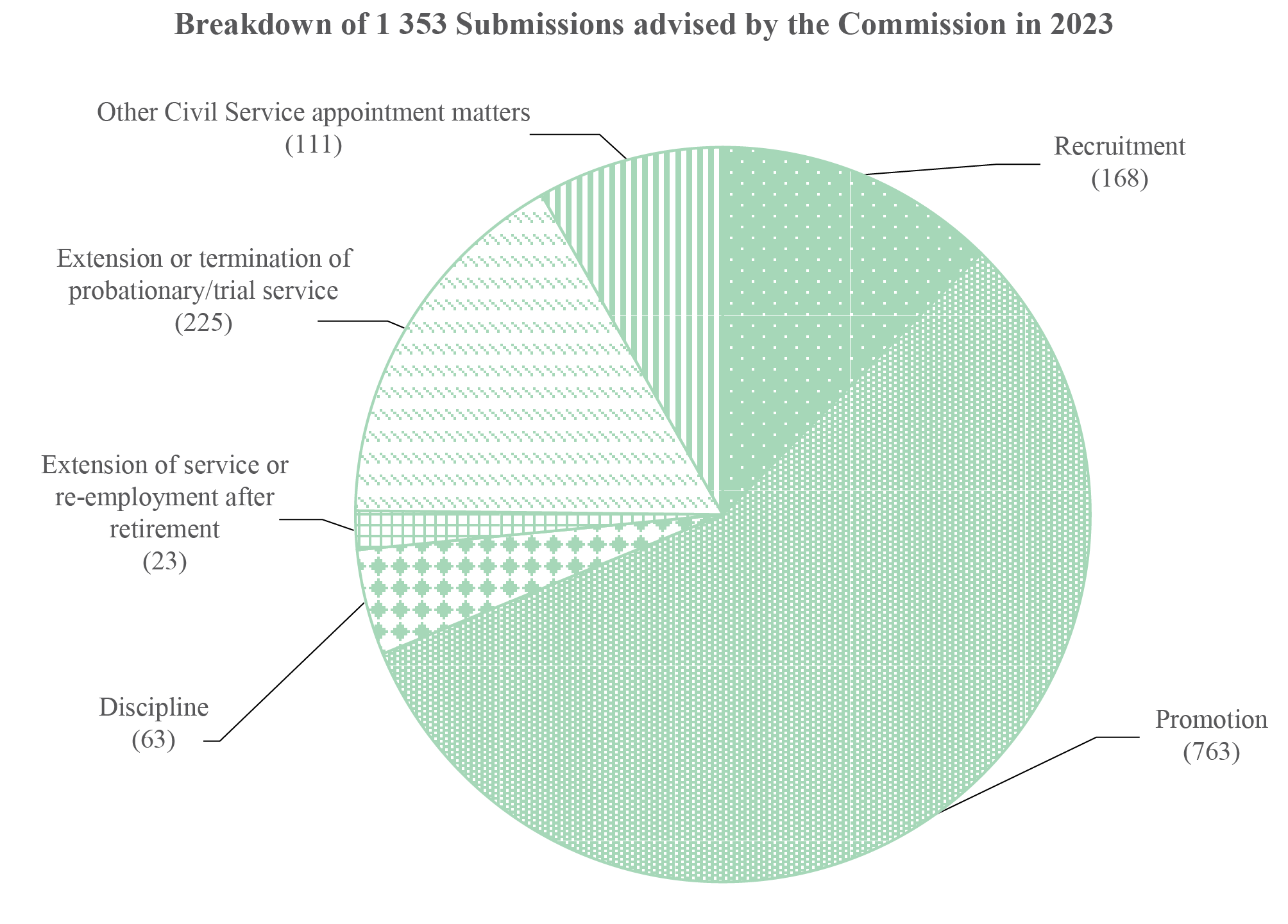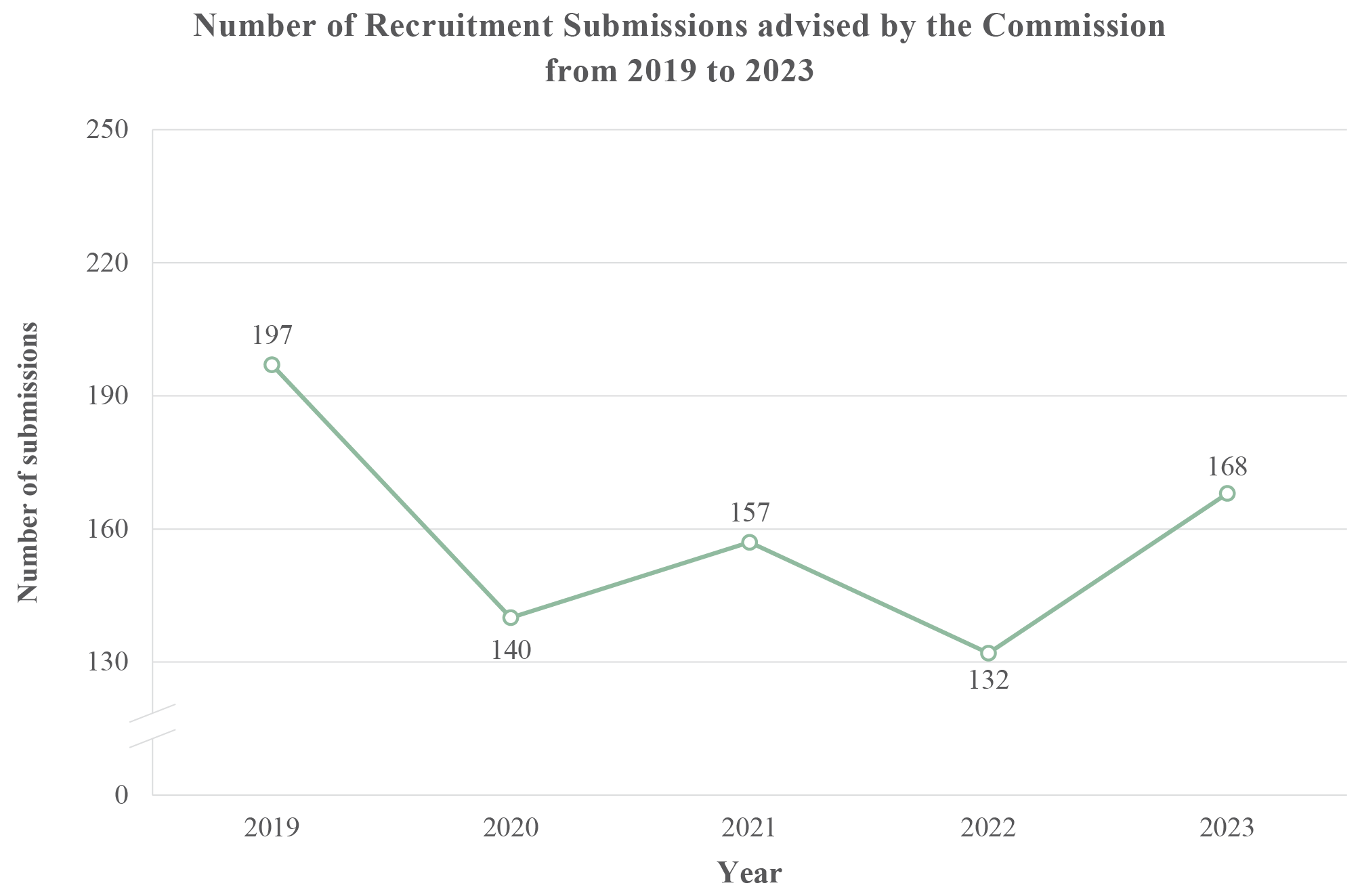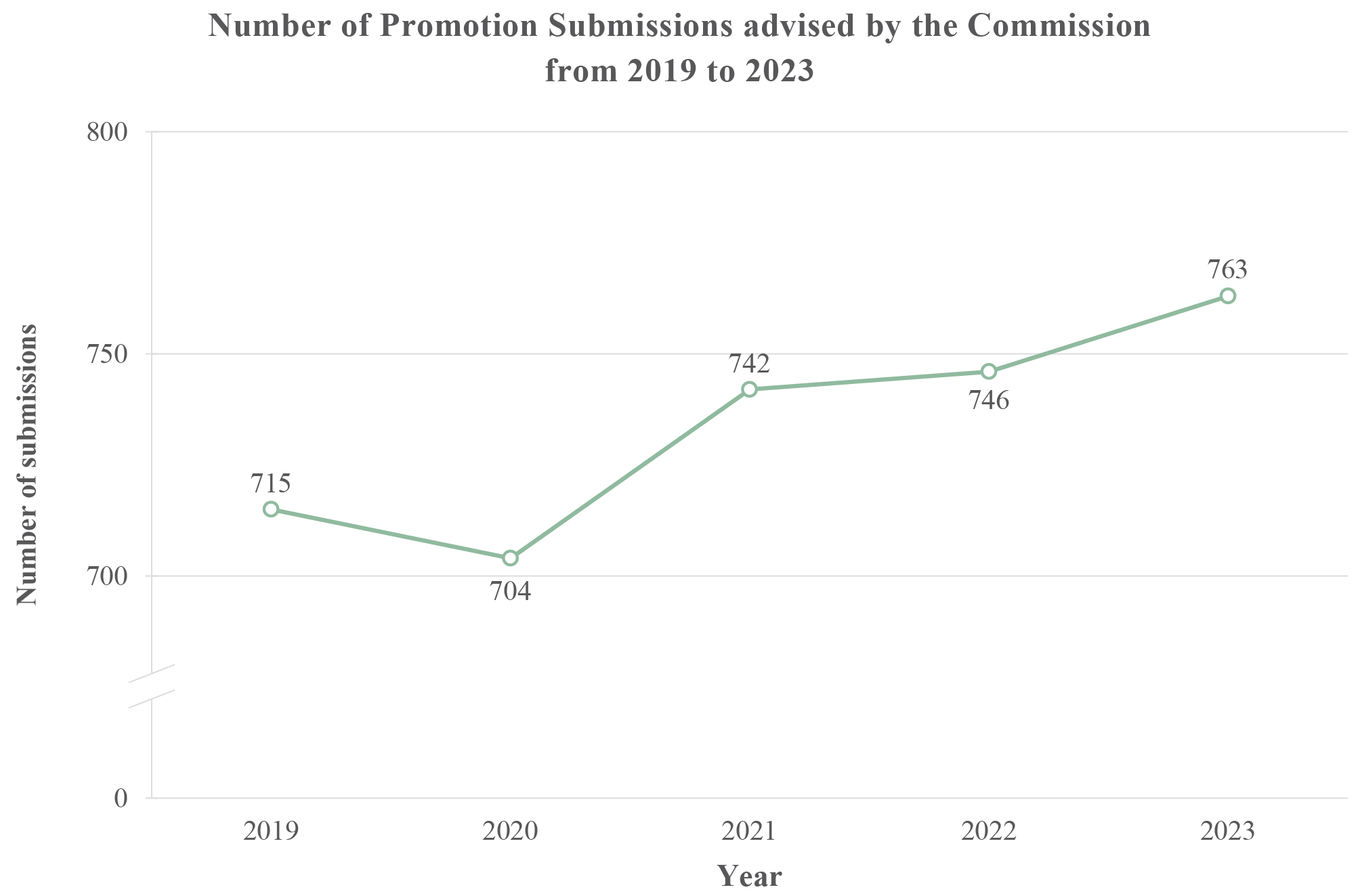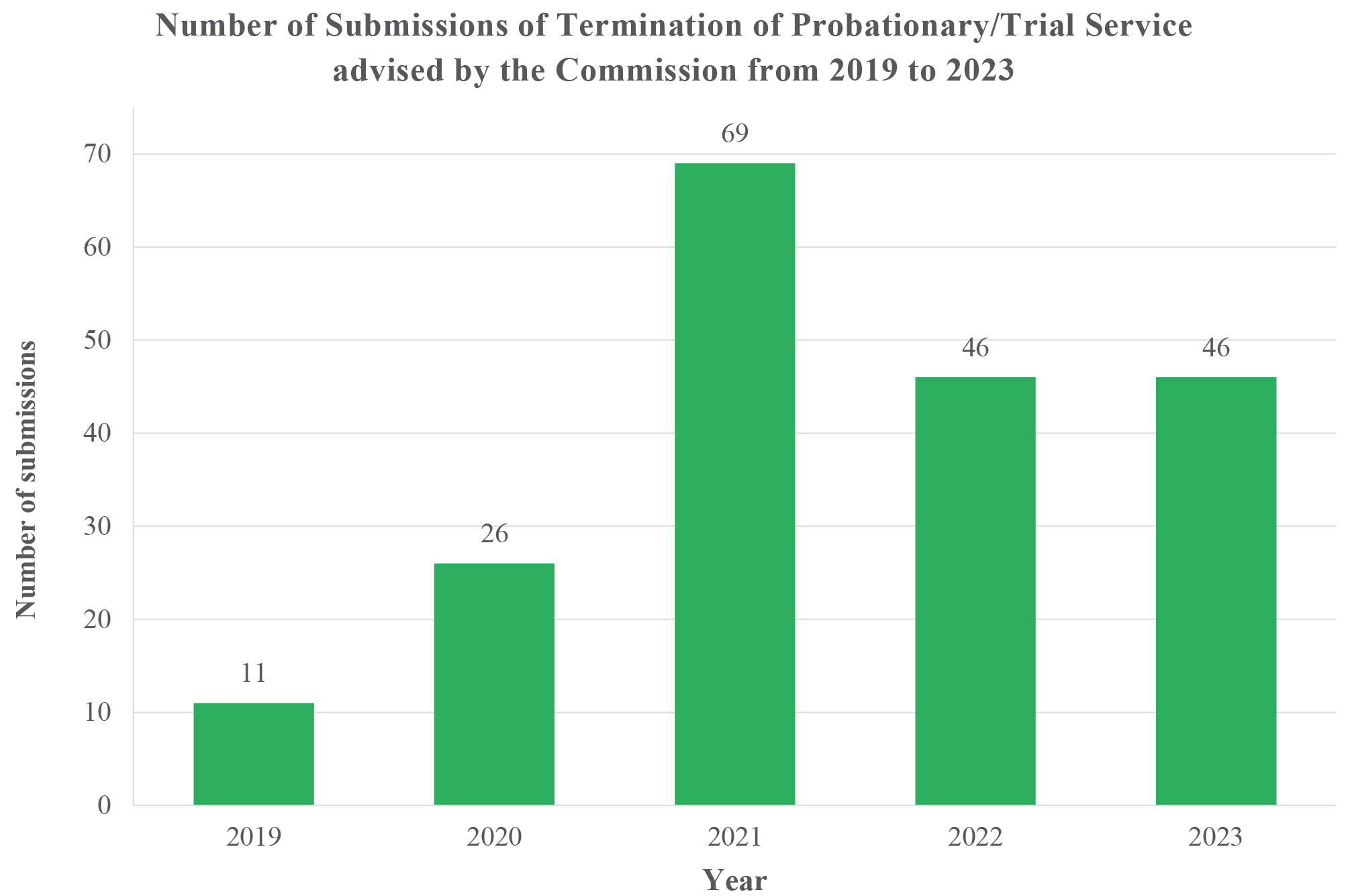Chapter 2
Chapter 2
Civil Service Appointments
2.1
Civil servants, who are the backbone of the HKSAR Government, are duty-bound to observe and implement the principle of “One Country, Two Systems”, safeguard national security as well as uphold the Basic Law and the rule of law. Maintaining a workforce of civil servants, who are loyal to the Government, dedicated to their duties, committed to serving the community and at the same time objective and impartial in the discharge of duties, is of vital importance to the effective governance of the Government. In view of the foregoing, Civil Service appointment has to be highly selective to ensure that only the most suitable and meritorious are recruited and appointed into the Civil Service.
2.2
In 2023, the Commission considered and tendered advice on 1 353 case-specific submissions with breakdown below –

2.3
Apart from tendering advice and observations on case-specific submissions, the Commission also works closely with CSB to provide views on new appointment policies, improve and streamline appointment procedures as well as propose subjects for review, where appropriate, for a better and more efficient appointment system. In particular, pursuant to the initiative of strengthening the Civil Service management system as announced in the CE’s 2022 Policy Address, CSB consulted the Commission in 2023 on its proposals to streamline the prevailing mechanism of retiring civil servants with persistent sub-standard performance under s. 12 of the PS(A)O. An overall account of the Commission’s work is detailed in this Chapter.
2.4
Recruitment to the Civil Service is undertaken by CSB and individual B/Ds which may take the form of an open recruitment or in-service appointment or both. Where submissions are required to be made to the Commission6, we need to be satisfied that objective selection standards and proper procedures are adopted in the process. B/Ds are required to consult the Commission in advance on the introduction of any new shortlisting criteria in a recruitment exercise to ensure that they are appropriate and fair. We also advise B/Ds on measures to enhance the efficiency and effectiveness of the recruitment process so that offers can be made to successful candidates as early as possible.
6
They refer, for the purpose of recruitment, to ranks attracting a maximum monthly salary not less than the amount specified at Master Pay Scale Point 26 ($57,390 as at end-2023) or equivalent, but exclude (a) the basic ranks of non-degree entry and non-professional grades; and (b) judicial service, the Independent Commission Against Corruption and the disciplined ranks of the Hong Kong Police Force which are specifically outside the purview of the Commission.
2.5
In 2023, the Commission advised on 168 recruitment submissions involving the filling of 1 887 posts, of which 1 800 posts (in 159 submissions) were through open recruitment and 87 posts (in nine submissions) by in-service appointment. A statistical breakdown of these appointments is provided at Appendix IV. The number of recruitment submissions advised by the Commission in the past five years is shown below –

More observations made by the Commission in the year relating to recruitment are provided in Chapter 3.
Civil Service Promotion
2.6
The role of the Commission in advising the Government on promotions7 in the Civil Service is to ensure that only the most suitable and meritorious officers are selected to undertake the higher rank responsibilities through a fair and equitable promotion system. In examining promotion submissions from B/Ds, the Commission will need to be satisfied that proper procedures have been followed and that the fair claims of all eligible officers have been considered on an equal basis, regardless of their terms of appointment, against the objective criteria of ability, experience, performance, character and prescribed qualifications, if any. The Commission also makes observations on the conduct of promotion exercises and matters relating to performance management with a view to bringing about improvements where inadequacies are identified as well as enhancing the efficiency and quality of the overall Civil Service promotion system as a whole.
7
Under the purview of the Commission, recommendations on promotion to middle and senior ranks, i.e. those attracting a maximum monthly salary not less than the amount specified at Master Pay Scale Point 26 or equivalent, are required to be submitted to the Commission for scrutiny and advice. The judicial service, the Independent Commission Against Corruption and the disciplined ranks of the Hong Kong Police Force are outside the purview of the Commission.
2.7
In 2023, the Commission advised on 763 promotion submissions involving the recommendations of 10 407 officers for promotion or acting appointment. The number of promotion submissions advised by the Commission in the past five years is shown below –

2.8
Promotions have to be earned on the basis of merits, and hence are competitive. The recommendations of a promotion board have to stand up to scrutiny and the relevant board has to answer the queries raised by the Commission and provide justifications and objective evidence to support them. A numerical breakdown of these submissions and a comparison with those in the past four years are provided at Appendix V. Some specific observations made by the Commission on these submissions are provided in Chapter 4.
2.9
Pursuant to the Government’s policy decision announced in January 2015 to extend the service of civil servants, an adjusted mechanism for further employment beyond retirement age for a longer duration than final extension of service8 (hereafter referred to as “FE”) was fully implemented from June 2017 after consulting the Commission.
8
A civil servant on permanent terms may apply for a final extension of service for a maximum period of 120 days on operational or personal grounds beyond his prescribed retirement age subject to any applicable arrangements and criteria prevailing at the time of the application as may be promulgated from time to time by the Government.
The FE scheme
2.10
Under the FE scheme, eligible officers may be considered for FE through a selection process, which has been institutionalised by making reference to the modus operandi of promotion and recruitment boards. The Commission’s advice is required for FE if the posts concerned are under our purview. In 2023, the Commission considered 23 FE submissions and supported the extension of service of 75 officers for a period ranging from four months to five years in aggregate. A breakdown of the number of submissions involving extension of service or re-employment after retirement advised by the Commission in 2023 and a comparison with those in the past four years are provided at Appendix VI
Management of Officers on Probation/Trial
2.11
Requiring an appointee to undergo a probationary/trial period serves manifold purposes, including –
(a)
providing an opportunity for the officer to demonstrate his suitability for further appointment in the Civil Service;
(b)
allowing the appointment authority to assess the performance and conduct of the appointee and be satisfied that he/she is fit for continuous employment; and
(c)
giving the appointee time to acquire the necessary qualifications or pass the prescribed tests for further appointment in respect of specific Civil Service jobs.
To uphold the proper administration of the probation/trial system, HoDs/Heads of Grade (HoGs) have the overall responsibility of overseeing the management of officers on probation/trial including the provision of necessary training, coaching and counselling to help them fit into their jobs. Continual monitoring and regular feedback on their performance aside, B/Ds have to be mindful and be prepared to take decisive action to address any problems that may surface during the probationary or trial period.
2.12
To maintain a high quality Civil Service, it is vital for HoDs/HoGs to adopt stringent suitability standards in assessing the performance and conduct of officers on probation/trial to ensure that only those who are suitable in all respects are allowed to pass the probation/trial bar for continued appointment. According to the guidelines promulgated by CSB and as provided for under Civil Service Regulations (CSRs), termination of an officer’s probationary/trial service is not a punishment. If at any time during the probationary/trial period, an officer on probation/trial is found to have failed to measure up to the required standards of performance/conduct or has shown attitude problems and displayed little progress despite having been given guidance and advice by their supervising officers and/or GMs, the HoD/HoG concerned should take early and resolute action to terminate his service under CSR 186/200 without the need to wait until the end of the probationary/trial period or recourse to disciplinary proceedings.
2.13
While fair opportunities should be given to new appointees to pursue a long-term career in the Government, extension of probationary/trial period should not be used as a substitute for termination of service or solely for the purpose of giving an appointee more time to prove his suitability. In accordance with CSR 183(5)/199(3), a probationary/trial period should normally be extended only when there have not been adequate opportunities to assess the officer’s suitability for passage of the probation/trial bar because of his absence from duty on account of illness or study leave; or when there is a temporary setback on the part of the officer in attaining the suitability standards or acquiring the prescribed qualifications for passage of the probation/trial bar beyond his control. It is only in very exceptional circumstances where the officer, though not yet fully meeting the suitability standards, has shown positive and strong indication to be able to achieve the standards within the extension period that an extension of his probationary/trial period should be granted. Besides, the period of an extension should not be decided arbitrarily. Rather, B/Ds should fully consider the circumstances and merits of each case and assess the time required by the management to come to a view on whether the officer concerned should be allowed to pass the probation/trial bar.
2.14
In 2023, the Commission recorded a total of 46 submissions requiring the termination of probationary/trial service of the officers concerned. Most of these submissions were related to unsatisfactory performance and/or conduct.

2.15
There were another 179 submissions involving extension of probationary/trial service in the year. Most of these extensions were needed to allow time for the officers concerned to demonstrate their suitability for permanent appointment/passage of trial bar on grounds of a temporary setback in performance, minor lapses in conduct or absence from duty for a prolonged period due to the officers’ health conditions, or pending the acquisition of requisite qualifications prescribed for continued appointment. A statistical breakdown of these submissions and a comparison with those in the past four years are provided at Appendix VII.
2.16
Summary disciplinary actions9 taken by B/Ds are outside the purview of the Commission (i.e. the Commission’s advice is not required before a verbal or written warning is administered). However, the Commission is concerned about the inconsistency in standards adopted by B/Ds in the issue of the warnings to some officers on probation/trial who have misconducted themselves. At the request of the Commission, CSB launched a pilot scheme in April 2023 to strengthen the monitoring of summary disciplinary actions against officers on probationary or trial terms, particularly the standards applied by the departments. A total of four departments were selected to participate in the pilot scheme, i.e. the Department of Health, the Fire Services Department, the Food and Environmental Hygiene Department, and the Leisure and Cultural Services Department. CSB will review the effectiveness of the pilot scheme and consider the way forward taking into account the operational experience one year after its implementation. The Commission appreciates CSB’s efforts in implementing the pilot scheme and gauging periodic feedback from the pilot departments in the interim.
9
Summary disciplinary actions which comprise verbal and written warnings are aimed at enabling departmental managers and frontline supervisors to correct and deter minor acts of misconduct swiftly to achieve the desired deterrent effect. A verbal or written warning will normally debar an officer from promotion and appointment for six months or one year respectively from the date of the issue of the warning. During the debarring period, the officer should not normally be considered for promotion and appointment.
Other Civil Service Appointment Matters
2.17
In 2023, the Commission advised on 111 other appointment submissions. They cover cases of non-renewal or extension of agreement; secondment10; opening-up arrangement11; review of acting appointment and updating of Guide to Appointment (G/A)12. A statistical breakdown of these submissions and a comparison with those in the past four years are provided at Appendix VIII.
10
Secondment is an arrangement to temporarily relieve an officer from the duties of his substantive appointment and appoint him to fill another office not in his grade on a time-limited and non-substantive basis. Normally, a department will consider a secondment to fill an office under its charge if it needs skills or expertise for a short period of time and such skills or expertise are only available from another Civil Service grade.
11
Under the opening-up arrangement, positions in promotion ranks occupied by agreement officers are opened up for competition between the incumbent officers and eligible officers one rank below. This arrangement applies to both overseas agreement officers who are permanent residents and are seeking a further agreement on locally modelled conditions, and other agreement officers applying for a further agreement on existing terms.
12
The G/A is an official document prepared by departments for individual ranks to specify the qualification, requirements and the terms of appointment for recruitment or promotion to respective ranks. B/Ds are required to update the entry requirements, terms of appointment, and job description of grades under their purview in the respective G/As on an on-going basis for CSB’s approval.
Retirement in the public interest under s.12 of the PS(A)O
2.18
Retirement in the public interest under s.12 of the PS(A)O is not a form of disciplinary action or punishment but pursued as an administrative measure in the public interest on the grounds of –
(a)
persistent sub-standard performance when an officer fails to reach the requisite level of performance despite having been given an opportunity to demonstrate his worth; or
(b)
loss of confidence when the management has lost confidence in an officer and cannot entrust him with public duties.
An officer who is required to retire in the public interest may be granted retirement benefits. In the case of a pensionable officer, a deferred pension may be granted when he reaches his statutory retirement age. In the case of an officer under the CSPF Scheme, the accrued benefits attributable to the Government’s Voluntary Contributions will be payable in accordance with the rules of the relevant scheme.
2.19
As an initiative to strengthen the management of persistent sub-standard performers and expedite the process for taking the necessary actions as announced in the CE’s 2022 Policy Address, CSB had reviewed and streamlined the s.12 procedures in the year. Having consulted the Commission and collected views from the management and staff sides, the streamlined mechanism was promulgated in September 2023. While maintaining the same threshold for invoking s.12 action13, a number of enhancements were introduced under the streamlined mechanism with a view to achieving timely termination of the service of civil servants whose performance persistently fails to meet the required standard of their ranks despite assistance and counselling provided by their B/Ds
13
The Government can initiate the s.12 mechanism when efforts to help an officer improve have not achieved the desired results, and when the unsatisfactory performance [defined as an overall rating of “5” (i.e. unsatisfactory performance) or “6” (i.e. poor performance) on a six-level rating scale] has made up a total of not less than six months.
Key measures under the streamlined s. 12 mechanism include –
(a)
cutting down multiple representations to be sought from the officer concerned;
(b)
waiving the requirement for establishing an independent panel to advise HoD on a s.12 case;
(c)
simplifying the procedures for the observation period; and
(d)
making it mandatory to stop/defer increment for the officer concerned in accordance with the prevailing procedures and practices.
2.20
In addition to organising briefings and devising a procedural guide to facilitate the effective implementation, CSB has reiterated to B/Ds that supervising officers should adopt honest reporting with zero tolerance towards persistent sub-standard performers and encouraged B/Ds to make good use of the streamlined mechanism. HoDs/HoGs have also been reminded to pay personal attention to potential and on-going s.12 cases to ensure that these cases should be handled under the streamlined procedures with reasonable progress. To facilitate the enforcement of s.12 action and to achieve consistency in performance assessment within the Government, CSB has taken on board the Commission’s suggestion in urging those B/Ds, which have yet to use the standard six-tier rating scale for overall grading, to adopt it in their appraisal forms.
2.21
During the year, a total of nine officers from nine B/Ds were put under close observation due to their persistent sub-standard performance14 and the Commission’s advice was sought on one case. The officer of that case was retired in January 2024. One officer had resigned out of his own accord after the observation period but before his case was put forward for consultation with the Commission. As at the end of 2023, seven officers remained under close observation.
14
Of these nine cases, five were processed under the mechanism for handling civil servants with persistent sub-standard performance under s.12 of PS(A)O modified in 2005, and four under the streamlined mechanism promulgated in 2023.
2.22
The Commission is in support of the Government’s proactive move in stepping up efforts to tighten the management of persistent sub-standard performers. Moving forward, CSB is committed to working closely with the departmental managements in order to better monitor potential and on-going cases of s. 12 action. Additionally, we will continue to draw B/Ds’ attention to potential s.12 cases in the course of processing promotion submissions, aiming to uphold the high standard of the Civil Service and ensure that cases involving persistent sub-standard performers are appropriately addressed.


